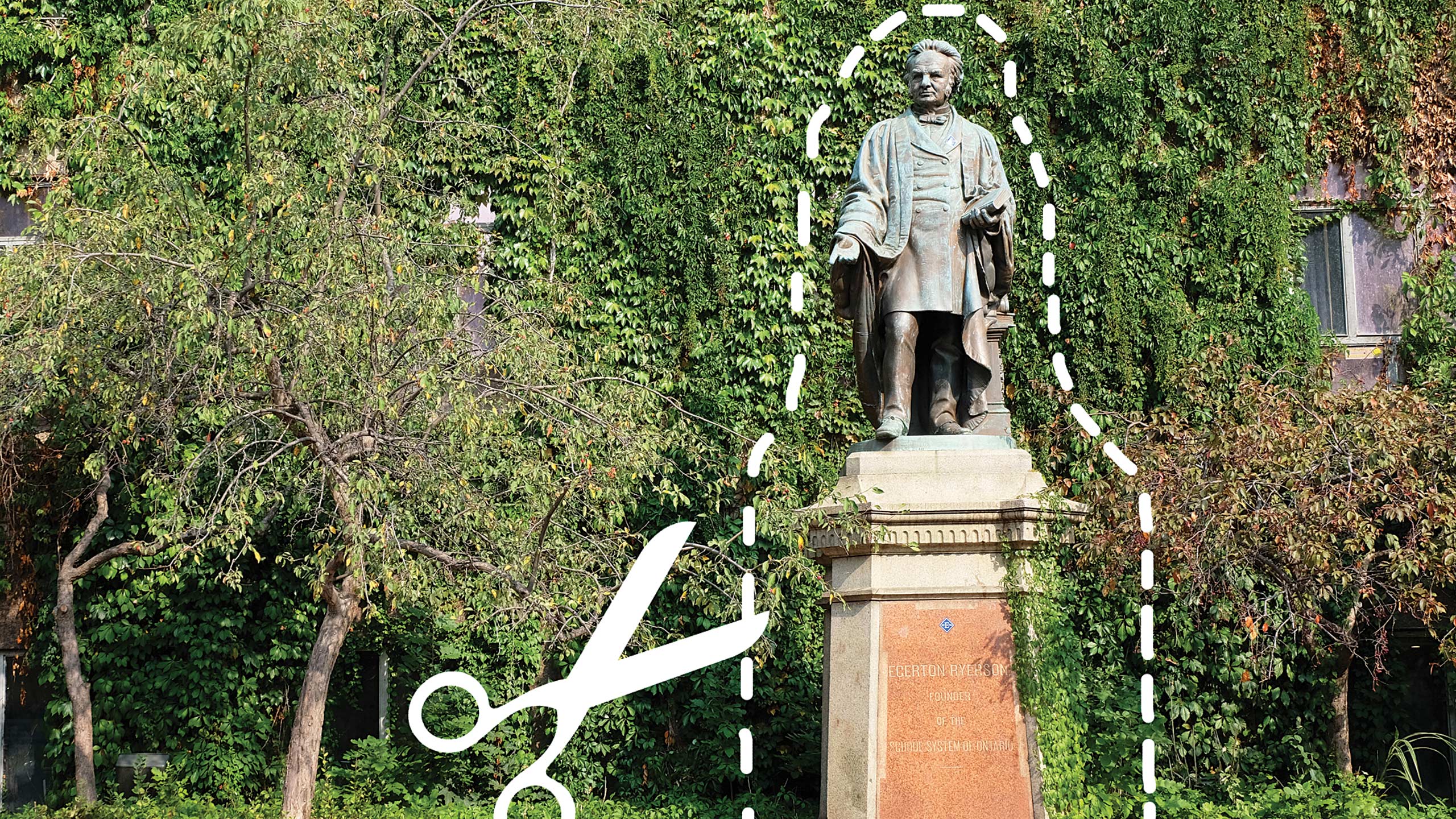By Sarah Tomlinson and Heidi Lee
The Standing Strong (Mash Koh Wee Kah Pooh Win) Task Force has laid out 22 formal recommendations to Ryerson University in its final report, delivered to and approved by the university’s Board of Governors (BoG) at a special meeting on Thursday. It includes a recommendation to rename Ryerson.
The recommendations also involve reconsidering the school’s mascot, advancing Black and Indigenous scholarship, implementing an Indigenous medicines garden, and more.
To ensure the recommendations are implemented, the report asked the university to develop an action plan by Jan. 31, 2022 and urged the school to provide annual updates on its progress. At Thursday’s BoG meeting, Ryerson president Mohamed Lachemi agreed to keep the community updated on the progress of all 22 recommendations.
“Our recommendations are future-oriented and reflect the kind of ancestors we wish to become for our next seven generations,” the report reads. “Our recommendations are not based on either vilification or vindication of [Egerton Ryerson].”
The first recommendation outlines the five principles of commemoration: transparency, respectful collaboration, purposeful representation, Truth and Reconciliation and humility and continuous learning.
One of the recommendations calls for the university to establish a standing committee to review naming proposals and make recommendations to decision-makers at the university in regards to renaming the university.
Concerning the Egerton Ryerson statue toppled by protesters in June, the report asks that the university put out a call for proposals for the “rehoming” of the remaining pieces of the statue to provide educational resources.
The “Eggy” mascot is also asked to be “reconsidered” as the mascot’s full name is Egerton the Ram.
Educating members at Ryerson is another key component emphasized by the report—the university has a responsibility to teach its community on Egerton Ryerson’s history.
“For over a decade, students, faculty, staff and community activists—particularly Indigenous and Black community members—have completed paid and unpaid research on, and raised awareness about, these topics,” the report reads. “They have also mobilized the community to participate in conversations about the ongoing trauma and pain caused by the commemoration of colonial figures.”
“Our report recognizes the harm that has been caused by the university’s failure to prioritize historical research and meaningful community engagement about Egerton Ryerson’s work and legacy.”
It suggests the creation of a physical and interactive display on Egerton Ryerson’s legacy and the period in which he was commemorated at the university; a website containing the Task Force’s research and an informational video. The Task Force also requested that the university identify archives at other universities to “increase the accessibility of materials related to Egerton Ryerson.”
The report further suggests that all programs implement mandatory opportunities for students to learn about Indigenous history, and that all faculty and staff complete a training module on colonial relations and the residential school system.
It encourages the university to actively hire more Black and Indigenous faculty members.
It also advocates for additional funding for Black and Indigenous undergraduate and graduate students in an effort to dismantle the systemic barriers the Task Force says were partially created by the Common Schools Acts, which was drafted by Egerton Ryerson and contributed to the creation of racially segregated schools.
To recognize the role public spaces play in strengthening communities and the school’s responsibility to care for the land it’s situated on, the report mentioned the creation of an interactive public art installation in a “prominent” location on campus, as well as a garden for cultivating Indigenous medicines.
The Task Force calls for the university to plan ceremonies at the former site of the statue for community members to heal.
The report also asks the university to consider a new, university-wide protocol for land acknowledgements.
Additionally, the school is required to provide an update on the implementation of the recommendations from the 2018 Truth and Reconciliation Community Consultation report and the 2020 Anti-Black Racism Campus Climate Review Report.
The release of the Standing Strong Task Force’s report comes after years of demands from community members to properly address Egerton Ryerson’s colonial legacy.
The report said the Task Force initially reviewed research to gain a common understanding of the “intent and impact of colonization.” Then, from January to March, it hired a team of researchers to study the life and legacy of Egerton Ryerson, which included looking at data from over 60 universities and working with several historians, scholars and archivists.
In March, the Task Force—chaired by campus elder Joanne Dallaire and chair of the Department of History at Ryerson Catherine Ellis—launched a five-question survey as part of their two-month engagement period, which closed on May 16, 2021, The Eyeopener previously reported. The survey received 22,860 individual question responses.
The Task Force conducted two different presentations on March 23 and April 8 which had 195 participants in total.
Through a “community tool kit,” which provided conversation starters and resources, there were over 18 community conversations with over 250 participants.
The Task Force also considered open letters, media coverage and over 250 direct messages they received. Then, June 2021 was used as a period for discussion and deliberation.
Through their research, the report said it managed to engage over 11,000 participants.












Ruisi Liu
We should name it EyeOpener University 🙂